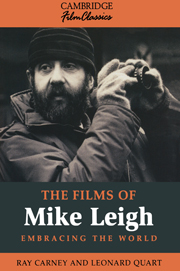Book contents
- Frontmatter
- Contents
- Editorial Note
- Acknowledgments
- Biographical and Cultural Introduction
- 1 Stylistic Introduction: Living beyond Consciousness
- 2 Fictitious Selves: Bleak Moments
- 3 Personal Freezing and Stylistic Melting: Hard Labour
- 4 Existence without Essences: The Kiss of Death
- 5 Defeating Systems of Knowing: Nuts in May
- 6 Losing Track of Who You Are: Abigail's Party
- 7 We Are the Hollow Men: Who's Who
- 8 Inhabiting Otherness: Grown-Ups
- 9 Manufactured Emotions: Home Sweet Home
- 10 Challenging Easy Understandings: Meantime
- 11 Holding Experience Loosely: High Hopes
- 12 Circulation Is the Law of Life: Life Is Sweet
- 13 Desperate Lives: Naked
- Epilogue: The Feel of Life
- Notes
- Filmography
- Bibliography
- Index
1 - Stylistic Introduction: Living beyond Consciousness
Published online by Cambridge University Press: 05 June 2012
- Frontmatter
- Contents
- Editorial Note
- Acknowledgments
- Biographical and Cultural Introduction
- 1 Stylistic Introduction: Living beyond Consciousness
- 2 Fictitious Selves: Bleak Moments
- 3 Personal Freezing and Stylistic Melting: Hard Labour
- 4 Existence without Essences: The Kiss of Death
- 5 Defeating Systems of Knowing: Nuts in May
- 6 Losing Track of Who You Are: Abigail's Party
- 7 We Are the Hollow Men: Who's Who
- 8 Inhabiting Otherness: Grown-Ups
- 9 Manufactured Emotions: Home Sweet Home
- 10 Challenging Easy Understandings: Meantime
- 11 Holding Experience Loosely: High Hopes
- 12 Circulation Is the Law of Life: Life Is Sweet
- 13 Desperate Lives: Naked
- Epilogue: The Feel of Life
- Notes
- Filmography
- Bibliography
- Index
Summary
On the whole, life for most people is – get born and survive as best you can for as long as you can, till it's all up. The norm for most people in the world is that life is hard work; it's tough. It's not about being winners or losers. It's about coping. The minute anything extraordinary or exotic happens [in a film], I get bored. Most movies are about extraordinary or charmed lifestyles. For me what's exciting is finding heightened drama, the extraordinary in the ordinary – what happens to ordinary people … the entirely disorganized and irrational business of living.
–Mike LeighThe best way to define the distinctive qualities of Leigh's work (and the implicit challenge it presents for viewers) is to notice its difference from mainstream American film. Hollywood movies are basically devoted to achievement. Characters are defined in terms of their ability to do things (anything from freeing the hostages to getting the girl) – frequently by being pitted against each other in tests of wit or prowess. Hollywood understands life as essentially a matter of competition, achievement, and reward.
A narrative organized around a series of problems for characters to solve or goals to achieve appeals to American viewers for at least two reasons. First, it makes the story easy to follow. Characters' progress (or failure to progress) can be measured in an almost step-by-step way.
- Type
- Chapter
- Information
- The Films of Mike Leigh , pp. 14 - 30Publisher: Cambridge University PressPrint publication year: 2000
- 1
- Cited by



